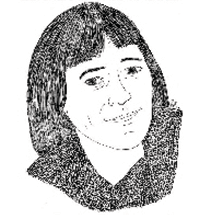As an active member of the queer community as well as a student of nonviolence, I am uncomfortable with gender roles. I have a complicated relationship with my own feminine identity, and so the idea of women having a special place in nonviolence is hard for me. However, I'm realizing that I want to approach this article in an archetypically feminine way-embodied in tangible reality rather than abstract thought alone, focusing on relationship with the reader. I believe that people of all genders can draw on this feminine energy, and perhaps our world would have less violence if more people did. Regardless, I thank you for walking this journey of an article with me.
My thoughts about cultural disobedience began when I was driving home from the Nevada nuclear test site through the rolling Sierra foothills. My coworker Amy told me of a friend who was sadly disappointed when he visited Camp Casey, where Cindy Sheehan was camping outside of Bush's ranch last summer. He saw two camps positioned on opposite sides of the street and refusing to talk to each other, with the energy so far from nonviolence's potential for reconciliation and mutual understanding (though more peaceful interactions did happen later on, as people gathered courage). It made me think of my own experience in antiwar protests on campus, when counter-protestors have shown up and the two groups have just yelled at, or over, each other. In these situations I want to reach out to the other side and try to change the adversarial dynamic, but I rarely muster the courage. In a culture that promotes argument and right-wrong, us versus them thinking, efforts to connect with my adversaries require cultural disobedience.
Albert Einstein, who called for a reformed "way of thinking" after humanity's development and use of the atomic bomb, remarked that "few people are capable of expressing with equanimity opinions which differ from the prejudices of their social environment. Most people are even incapable of forming such opinions." Before we can engage in civil disobedience, we must find the mental space in which we can critically examine the messages society immerses us in. This is especially important for resisting what Johan Galtung calls cultural violence-the ideologies that promote division among different peoples and that form the justification for much of the violence in our world. It's easy for any peace activist to see that American society is soaked in cultural violence and militarism. Nevertheless, much of our action for peace fails to embody peace, and I believe that the difficulty of being culturally disobedient explains why. As Alfred Alder points out, in our fighting society "it is easier to fight for one's principles than to live up to them."
The importance of cultural disobedience -- as a foundation for civil disobedience and for a consistent expression of nonviolence -- points to why so often spirituality is symbiotic with nonviolence. Having a higher allegiance, or a belief in a reality beyond the one we experience, can provide the necessary distance to critique our earthly cultures, as well as lessen our attachment to the status quo. This weekend I had the deep blessing of attending a Women's Ordination Conference, joining 120 other Catholic women who are agitating for the admission of women to the priesthood. It would be hard to find a more marginalized group in Catholicism than women who feel called to priesthood. And yet from this place of marginality they are able to criticize the earthly Church by holding it to the higher law of Jesus' inclusive gospel. It struck me how in addition to their obstructive program of advocacy and protest (what they call "the ministry of irritation"), they are enacting Gandhian constructive program in the truest sense: going ahead and ordaining themselves, forming women-led house churches, and consecrating the Eucharist. As with all constructive program, this adherence to the-world-as-it-should be eventually leads to conflict with the authorities and the potential for change.
--Barbara Deming
Of course spirituality is not necessary to be a nonviolent actor. Barbara Deming, a second wave feminist, lifelong peace activist, and influential theorist of nonviolence, was a strong proponent of secular nonviolence. She was also a lesbian, automatically occupying the margins of the present social order. Many radical queers today, myself included, experience this outcast space in American society as highly transformative, enabling solidarity with all other groups for whom this system is not working. Because my sexuality makes it impossible for me to be obedient to my culture, I experience a freedom of thought and allegiance that is similar to freedom of spirit. Dorothy Day, a lifelong practitioner of cultural disobedience, said that "our only problem is our faith in the dirty rotten system." She also said that responding to the seriousness of the world's situation is "a question of living your life in dramatically different ways." It is so much easier to do this when your culture already excludes you from the dominant way of life.
Deming also gifted us with a powerful metaphor for nonviolence, that of the two hands: "have as it were two hands upon [the oppressor]-the one calming him, making him ask questions, as the other makes him move." A moving example of this comes from Deming's own life. In 1983, Deming was one of 54 women arrested at the Seneca Women's Peace Encampment in upstate New York. Marines attempted to break up the action by force, but the women formed a circle on the ground, giving the double message, "We are no threat to you, but we will not be bullied; we will not be bullied, but we are no threat to you." Nonviolence combines a masculine self-assertion with a feminine desire to connect, in this case with the humanity of the oppressor.
Could women's knack for extending a hand be less about their channeling of feminine energy and more about the talent for reconciliation that the oppressed must develop in order to survive? Although nonviolence is not a tool of the weak, women do have a special potential to bring transformation precisely because of their marginal status. Wasn't it Jesus-- nonviolent actor, challenger of religious, economic, and yes, gender norms of his day, as well as victim of the death penalty-- who proclaimed that the meek shall inherit the earth? Yes-but we will recreate it first.

 Women clergy
Women clergy 
 Barbara Deming, feminist and nonviolent political activist
Barbara Deming, feminist and nonviolent political activist